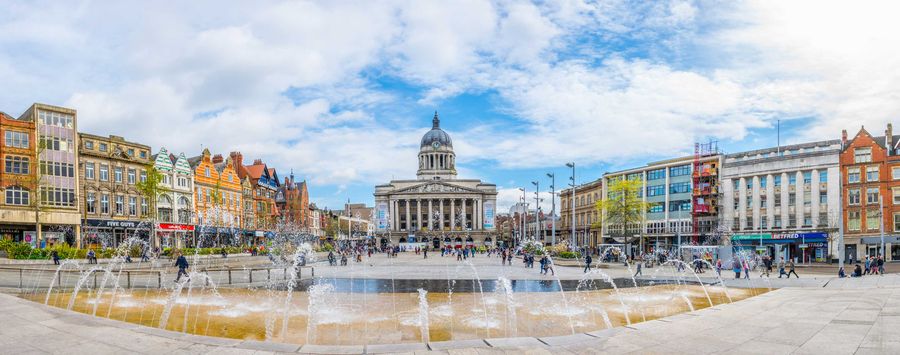
Nottingham
Nottingham, located in the heart of England, is a city where legend and history come together to create a rich and vibrant destination. Famous worldwide as the home of Robin Hood, Nottingham offers a fascinating journey through centuries of English history. From its medieval castle and underground caves to its role in the Industrial Revolution, Nottingham is a city where past and present blend seamlessly. Today, it is a thriving cultural and educational hub, offering visitors a diverse range of experiences, from exploring historic landmarks to enjoying a lively arts scene.
Nottingham’s origins stretch back to Saxon times, but it was during the Middle Ages that the city rose to prominence, largely due to its strategic position as a center for trade and governance. Nottingham Castle, originally built by William the Conqueror in 1068, played a crucial role in both medieval and Civil War conflicts. The city’s history is closely tied to the legend of Robin Hood, the heroic outlaw who is said to have roamed Sherwood Forest, challenging the tyrannical Sheriff of Nottingham.
During the Industrial Revolution, Nottingham became a center for textiles, especially lace-making, earning it the title of “Lace Capital of the World.” This industrial heritage has left its mark on the city’s architecture and identity, while Nottingham has continued to evolve into a modern, vibrant city known for its innovation, education, and culture.
Top 5 Unique Characteristics of Nottingham
1. Nottingham Castle
Nottingham Castle is one of the city’s most iconic landmarks, perched on a rocky outcrop with sweeping views of the city. Though the original medieval structure was destroyed, the current castle, built in the 17th century, is now a museum and art gallery showcasing a wide range of exhibits, from fine art to the city’s rich history. Visitors can explore the castle caves, a network of underground tunnels and chambers used for centuries as escape routes, cellars, and secret passageways. The castle’s connection to the Robin Hood legend makes it a must-see for history buffs and families alike.
2. The Robin Hood Legend
The legend of Robin Hood, Nottingham’s most famous resident, is alive and well in the city. Visitors can follow in the footsteps of the legendary outlaw by exploring Sherwood Forest, where Robin Hood is said to have hidden from the Sheriff of Nottingham. In the city center, you’ll find the Robin Hood Statue near Nottingham Castle, a popular photo spot for tourists. The annual Robin Hood Festival brings the story to life with medieval reenactments, archery contests, and entertainment for all ages, celebrating the spirit of this enduring English folk hero.
3. Nottingham’s Caves
Beneath Nottingham’s streets lies a fascinating network of over 800 caves, making it the city with the largest number of man-made caves in the UK. These caves, carved out of the soft sandstone, have been used for centuries as homes, storage, and even air raid shelters during World War II. Visitors can explore some of these caves through guided tours at the City of Caves, located in the Broadmarsh Shopping Centre, where you’ll learn about Nottingham’s hidden underground history.
4. Wollaton Hall and Deer Park
Wollaton Hall, an Elizabethan mansion set in beautiful parkland, is one of Nottingham’s grandest attractions. Built in the late 16th century, the hall is now home to the Nottingham Natural History Museum, with impressive collections of fossils, minerals, and taxidermy. The surrounding Wollaton Deer Park is a serene escape from the city, where visitors can enjoy a walk through the landscaped gardens and spot herds of deer roaming freely. Wollaton Hall even made an appearance as Wayne Manor in the 2012 Batman film, "The Dark Knight Rises."
5. Lace Market and Industrial Heritage
Nottingham’s Lace Market is a historic district that was once the center of the world’s lace industry. Today, the area is a vibrant hub of independent shops, cafes, and restaurants housed in beautifully preserved Victorian buildings. Visitors can explore the Nottingham Contemporary Art Gallery, one of the largest contemporary art spaces in the UK, or take a guided tour of the Lace Market Theatre. The Lace Market is a testament to Nottingham’s industrial past and its transformation into a modern cultural center.
Nottingham Today: A Thriving Modern City
In modern times, Nottingham has evolved into a city known for its innovation and culture. Home to two major universities, Nottingham University and Nottingham Trent University, the city has a young, dynamic energy that fuels its reputation as a center for education, research, and technology. The city’s Creative Quarter is a hub for startups, digital industries, and creative enterprises, cementing Nottingham’s role as a forward-thinking city.
Nottingham’s lively arts scene is highlighted by venues such as the Theatre Royal and the Royal Concert Hall, which host everything from West End productions to world-class orchestras. The city is also famous for its festivals, including the Nottingham Festival of Literature and the Nottingham Beer Festival, drawing visitors from far and wide.
Fun Facts About Nottingham
Nottingham’s Old Market Square is the largest public square in the UK, often hosting events, festivals, and markets.
The Ye Olde Trip to Jerusalem is one of the oldest pubs in England, dating back to 1189, and is built into the rock beneath Nottingham Castle.
Nottingham was named a UNESCO City of Literature in 2015, recognizing its rich literary history and contributions to the arts.
The Goose Fair, held every October, is one of the oldest and largest fairs in Europe, with a history dating back over 700 years.
The city is home to the National Ice Centre, a training ground for Olympic ice skaters, and hosts major sporting events at Trent Bridge cricket ground and Nottingham Forest Football Club.
With its legendary tales, historic landmarks, and vibrant modern culture, Nottingham is a city that offers something for everyone. Whether you're exploring its medieval roots, enjoying its parks and museums, or diving into its dynamic arts scene, Nottingham promises an unforgettable experience.